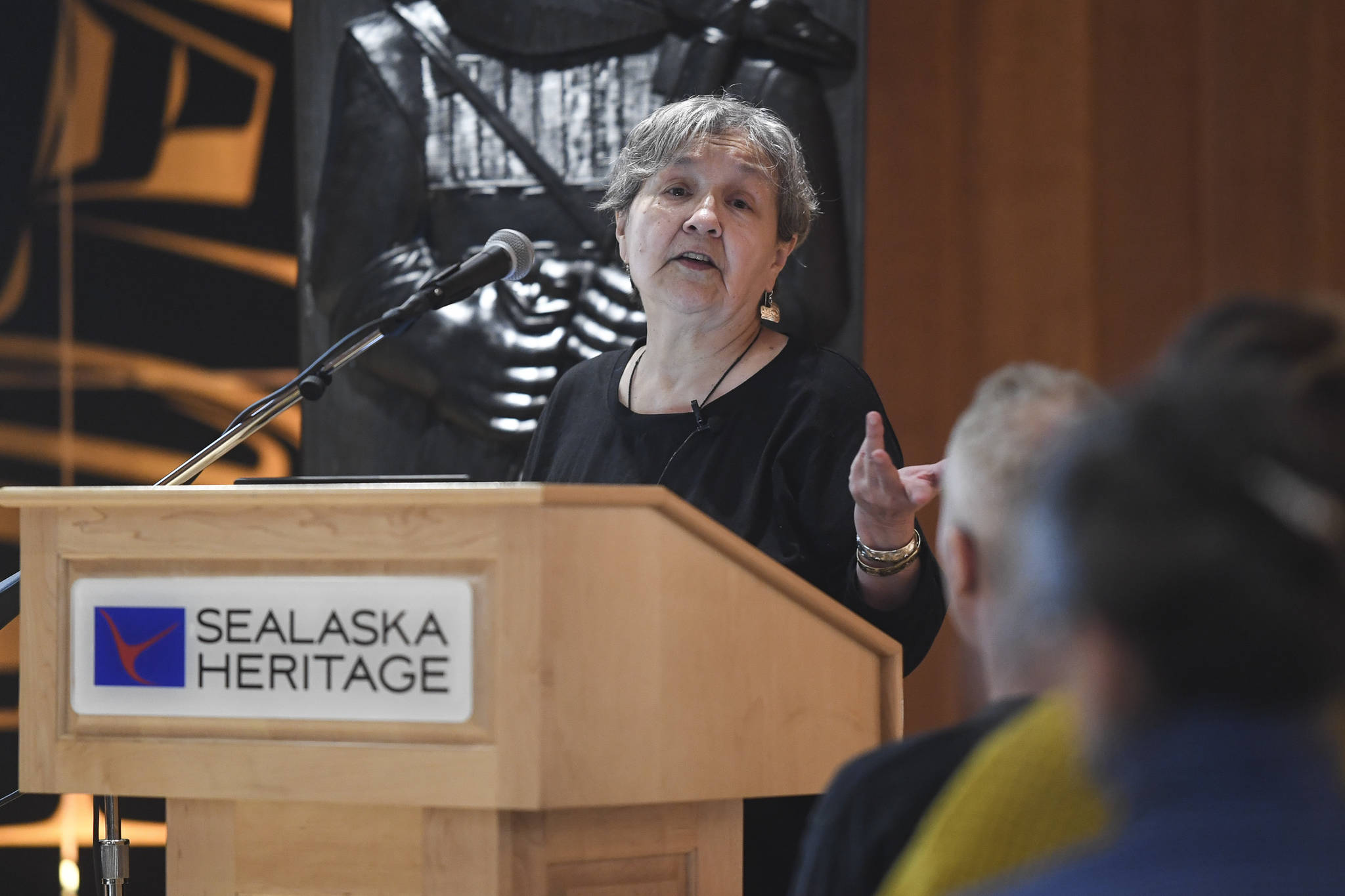Ernestine Hayes grew up listening to the stories her grandmother told her. Stories that said the Taku Winds that blew over their wooden home were the voice of her grandfather telling a young Hayes not to come out and play on the days he spoke too loudly. Stories that bears were her cousins and spiders were friends that carried their own tales.
Hayes spent her youth in the Juneau Indian Village, an area of downtown Juneau centered around what is now called Village Street. But it wasn’t always that way. The practice of having homes face a street, indeed even having homes for individual people or families were customs forced upon indigenous peoples by a colonial government, Hayes said.
These memories and their legacy were the subject of Hayes’ lecture at Sealaska Heritage Institute’s Walter Soboleff Building Monday, “Juneau Indian Village: Pilings, Pavement and Politics.” The lecture is part of a series this month for Native American and Alaska Native Heritage Month.
“The story of the Juneau Indian Village functions as metaphor for the Alaska Native itself,” Hayes told the packed clan house at SHI’s Walter Soboleff Building in downtown Juneau. “This new custom of facing the street turned people away from the sea, another emblem of the lived experience of colonization.”
Hayes recalled seeing the changes to her culture take place over the years and how those changes were forced upon the Tlingit people by outside forces. Clothing, hairstyles and the English language were all mandates of the American government on indigenous people across the United States.
The Dawes Act of 1887 broke up the communal holding of native lands and appropriated it to individuals, ending centuries of tradition and forcing a rejection of “uncivilized” culture, Hayes said.
“The Alaska Legislature devised a way where Alaska Native people could become American citizens by rejecting Alaska Native values,” Hayes said. “One of the residents taking advantage of that program included my grandfather. New laws made it impossible to catch and dry fish or to shoot deer.”
[Willoughby District considers a name change]
But the culture persisted, Hayes said, and even though the style of home was different, its kitchen was still the center of family life. Even as clothing styles and language changed, cultural identity could not be erased.
“The arc of the decolonized universe is long,” Hayes said, borrowing a phrase from Martin Luther King Jr. “But it bends toward justice.”
Hayes said that indigenous identity, sovereignty, education and economic power are expanding. She credited the leadership of Richard Chalyee Éesh Peterson, president of Central Council of the Tlingit and Haida Indian Tribes of Alaska for working to expand indigenous presence in the community.
“The future of the Juneau Indian Village depends on many variables,” Hayes said. “But our impetus has only strengthened.”
Following the lecture, other Alaska Natives shared their personal memories of village life.
“I can remember the village where the State Office Building currently sits, all the homes along the hill there,” said Mary Marks, who spoke about learning to heal cultural wounds. “Even though our culture has new meaning to it, it’s a different kind of culture that we’re still learning how to use. I still grab from the era of memory of how things were done, it still allows me that chance to begin that healing.”
Frances Houston, spokesperson for the Aak’w Kwaan, said she too remembered the stories her mother and grandmother told her.
“Gunalchéesh,” Houston said. “thank you for everything that you shared, it was everything that I remember from my mother and grandmother.”
But while indigenous authority has been expanded, and Native peoples have asserted themselves, the practice of American colonization hasn’t stopped, Hayes said in an interview with the Empire following the lecture.
“One of the practices of American colonization is to make sure that Native people, indigenous people, the original people remain in the past,” Hayes said. “You’ll see, even in textbooks and in a lot of people’s conversation, comments such as, ‘the Native people lived in this area, the Native people fished in this area.” She emphasized the use of the past tense.
“Well,” Hayes said, “we’re still here.”
While there is recognition of indigenous peoples, Hayes said, there isn’t always the recognition of what she called indigenous intellectual authority.
“It’s common practice to say, ‘Native people have so much wisdom,’ you hear that all the time, that indigenous people are so wise,” Hayes said. “Indigenous people have intellectual capacity and ability that in many cases surpasses Western colonial knowledge and intellectual ability.”
Hayes said that recognition of indigenous intellectual authority should extend beyond just indigenous matters to other areas of social life such as politics and the environment.
“If that had been the practice for a few years then maybe we wouldn’t be where we are today in this nation,” Hayes said. “So there.”
• Contact reporter Peter Segall at 523-2228 or psegall@juneauempire.com.

